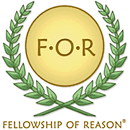
|
|
|
Reflections on a Dream by
Chris Snider (09/24/2002) Not long ago, FOR’s President, Dan Barber, recounted a conversation he had with one of his customers at his auto repair shop. In short, Dan’s customer believed that Michael Newdow (the atheist behind the lawsuit to remove “under God” from the Pledge of Allegiance) was doing his daughter a disservice, because she might be embarrassed, harassed, or somehow physically endangered by his actions. Dan’s response was “Well, then, by your definition Martin Luther King, Jr. should have kept quiet. He had kids, didn’t he?” Dan’s encounter led me to an Internet search on Dr. King, and ultimately to his famous “I Have a Dream” speech, which he delivered in August 1963 on the steps of the Lincoln Memorial in Washington, DC. Although
America today is by no means perfect when it comes to racial equality
and race relations, we have come so far that it’s easy to forget how
terrible things were in 1963 and how much danger Dr. King repeatedly
exposed himself and his family to.
He loved his children so much that he would rather risk them
getting hurt, or even killed, than to live one more day without doing
something to ensure that they lived a better life than was possible for
him. And as we all know,
Dr. King paid the ultimate price, because on April 4, 1968, he was
gunned down at a motel in Memphis, Tennessee. It
would be interesting to find out what Dr. King would have thought about
modern-day America. I have
little doubt he would be pleased at the progress we have made.
No doubt he would be pleased that the last three mayors of
Atlanta, his hometown, were black. No doubt he would be delighted to hear that – despite the
fact that they are Republicans - our current Secretary of State and our
National Security Advisor are black.
He would probably scold both white America and black America for
not having our priorities in the right place and for not getting along
as well as we should. I
won’t reprint the entire text of Dr. King’s “I Have a Dream”
speech, but I would like to include two brief passages, probably the
most famous words he ever wrote: I
have a dream that one day this nation will rise up and live out the true
meaning of its creed: "We hold these truths to be self-evident:
that all men are created equal." I have a dream that one day on the
red hills of Georgia the sons of former slaves and the sons of former
slave owners will be able to sit down together at a table of
brotherhood. I have a dream that one day even the state of Mississippi,
a desert state, sweltering with the heat of injustice and oppression,
will be transformed into an oasis of freedom and justice. I have a dream
that my four children will one day live in a nation where they will not
be judged by the color of their skin but by the content of their
character. I have a dream today. He
concludes by saying: When
we let freedom ring, when we let it ring from every village and every
hamlet, from every state and every city, we will be able to speed up
that day when all of God's children, black men and white men, Jews and
Gentiles, Protestants and Catholics, will be able to join hands and sing
in the words of the old Negro spiritual, "Free at last! Free at
last! Thank God Almighty, we are free at last!" Although
the balance of his speech is, appropriately, devoted to the plight of
black Americans at that time, I find it interesting to note how
inclusive the climax of his speech is.
It is ultimately not a call for the rights of black America only,
but for the rights of all Americans.
And because of that, Dr. King’s memory belongs to all
Americans. I’ve taken
some heat lately for saying that America is the freest nation on earth,
but I do believe that – and I’m thankful to Dr. King for the part he
played in making it true. Respond to this Commentary. |

